NewWorld
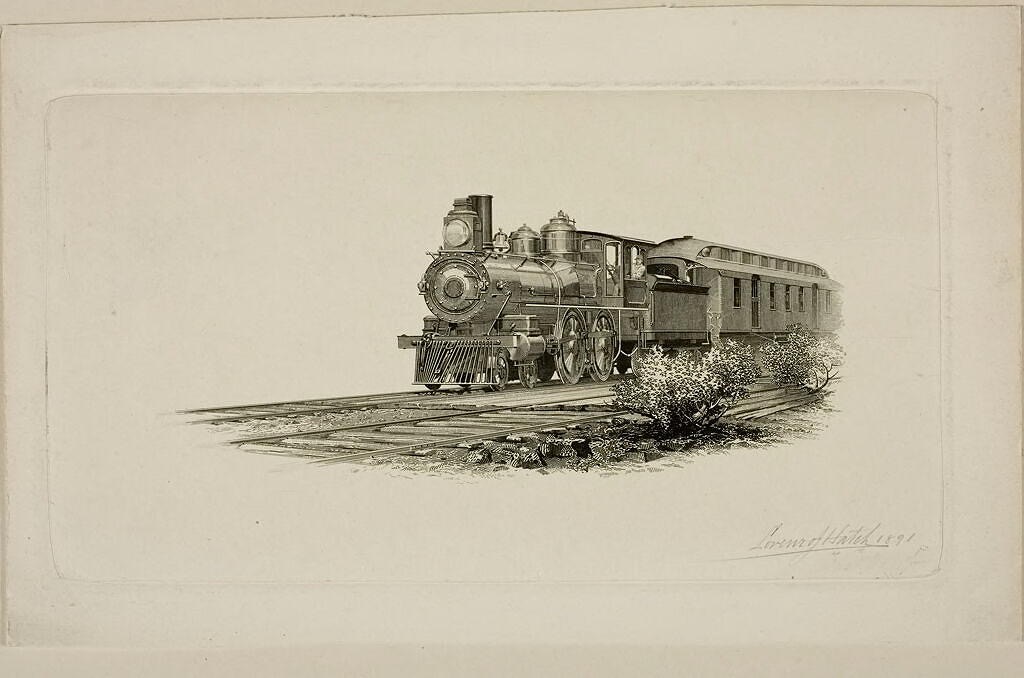
Lorenzo James Hatch: Locomotive (19th-20th century)
" … that success would ultimately cost him plenty."
As in every previous generation, arrival in a NewWorld involved stepping backward in time. The Schmaltzes and Welks had left behind their mature development in Ukraine, trading generations of successful adaptation for generations of even more of the same, starting from about where their displaced great-grandparents had begun when arriving on the undeveloped Steppe from Alsace a century before. Just before the turn of The American Century, North Dakota was closer to where it had been a century earlier than where it would end up a century later. The railroad had yet to cross half the state. Indeed, they arrived just as The Dakota Territory was admitted to the union as North and South Dakota. There were no paved roads in either state then. Settlers were still building sod houses, there being little available lumber or stone to create anything more substantial.
A government survey completed in the 1860s, when The Dakota Territory was first established, concluded that the area might productively host a dozen ranches, given the extreme weather and short growing season, and that most of those ranches might raise cattle rather than crops.
Selz
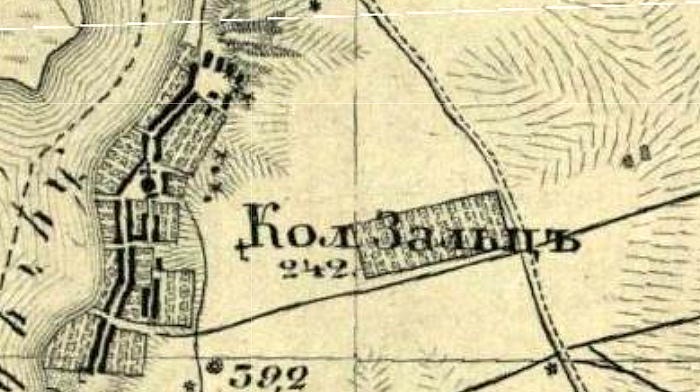
Kolonie Selz. Map by Alexander Ivanovich Mende (Mendt), 1853
"The city ceased to exist after it was evacuated during the Nazi retreat in 1944."
My fifth great-grandfather, Joseph (Josef) Schmaltz, was born on January 11, 1780, in Kapsweyer, Rhineland-Palatinate, Germany. He would die eighty years later in Kuchurhan, Odesa, Ukraine. My fourth great-grandfather, George Wilhelm Schmaltz, and his twin brother Heinrich "Henry," were born in 1804 in Germany. The family emigrated to Ukraine later that year, settling in a new town, Selz, in the Kutschurgan Valley, where the Kutschurgan River flows into the Djnester estuary, about forty miles from the district center, Odesa. This place was sandy river bottom land that melded into black prairie soil further from the river. They initially constructed rough brush huts, later building a substantial town complete with a large cathedral, a park, and extensive orchards.
Being German, much material has been passed down through the generations.
TheDeal
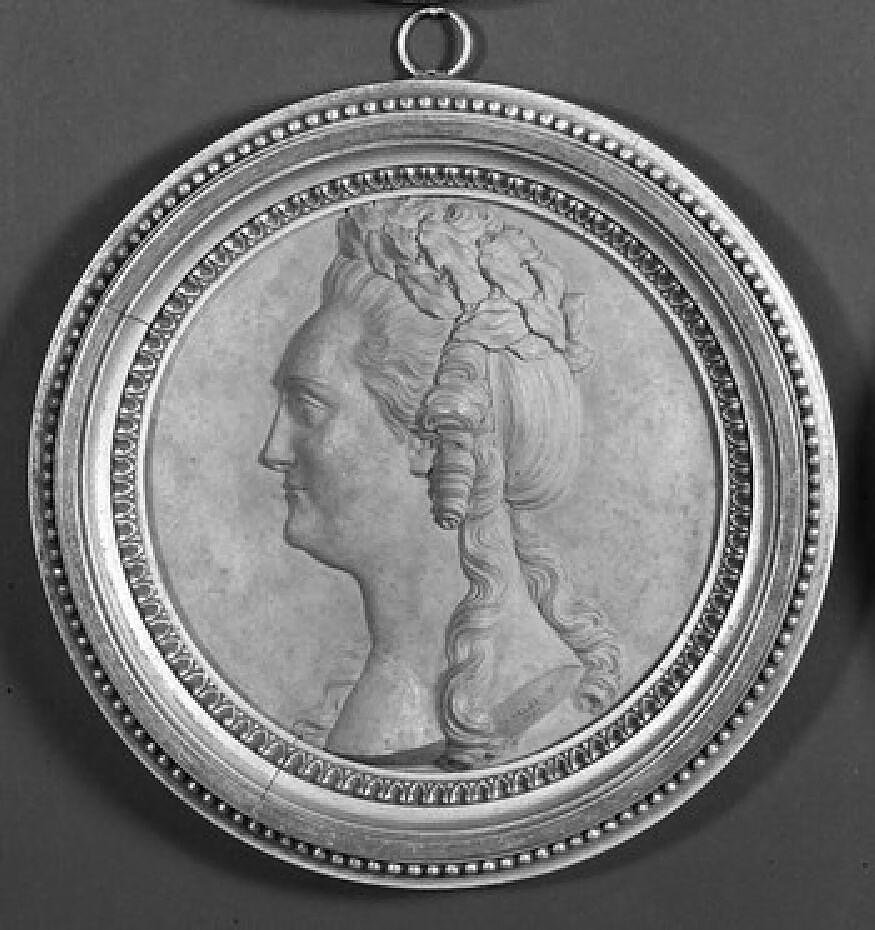
Giovanni Battista Nini: Catherine II (1771)
"Edens tend to come exclusively in their most primitive form."
By the end of The Seven Years' War, the surviving inhabitants of Germany were rightfully exhausted. Once again, squabbling between the crowned heads had devastated their lives. My Alsatian ancestors, still recovering from the Thirty Years' War and The Black Death's devastation, faced yet another displacement. Other German duchies had it worse. Catherine II, the former Prussian princess who'd married into the role of Empress of Russia before displacing her hapless husband once his heir was born, desired to bring Russia up to European economic standards so that she might continue financing her wars of acquisition. Russia remained a nation of serfs, still clinging to the Middle Ages, where a few wealthy landowners held the bulk of the labor captive. There was no entrepreneurial or independent farmer class; there were just serfs and sharecroppers who were successfully enjoined from demonstrating initiative on their own or even on the country's behalf. Catherine had recently won vast tracts of land from wars with Turkey and needed settlers to populate this largely uncultivated country. She proposed a deal she hoped might jump-start the languishing Russian economy to compete with Europe and the rest of the world while bringing that idle land into production.
In 1763, she issued a manifesto offering some rights and privileges to incoming foreign settlers.
Diaspora

Sarah Ann Wilson: Album Quilt (1854)
"My Fambly would attempt to bring their history forward with them and largely succeed …"
Alsace, situated along the Rhine between France and Germany, historically never considered itself a country. Like its neighbors to the east, it considered itself more of a duchy. It never had its own king. The Romans occupied the parts west of the Rhine but perhaps wisely left the other shore to the tribes and hoards, of which there were several in succession. It fell under the protection of the Carolingian dynasties, peaking with Charlemagne, whose sons bickered among themselves, dividing up the formerly united property. After that began the centuries under the Holy Roman Empire, where Alsace, being a border country, was traded back and forth among emerging countries. The Thirty Years' War brought Swedish troops, who tried to enforce Protestantism within its borders, and this seemed to work for Strasburg but failed in the countryside. Its residents looked to the Hohenstaufen emperors like Frederick I for protection and remained staunchly Roman Catholic.
As The Black Death ravaged the region in the mid-seventeenth century, age-old jealousies and hatreds eroded civil order.
Weekly Writing Summary For The Week Ending 4/25/2024
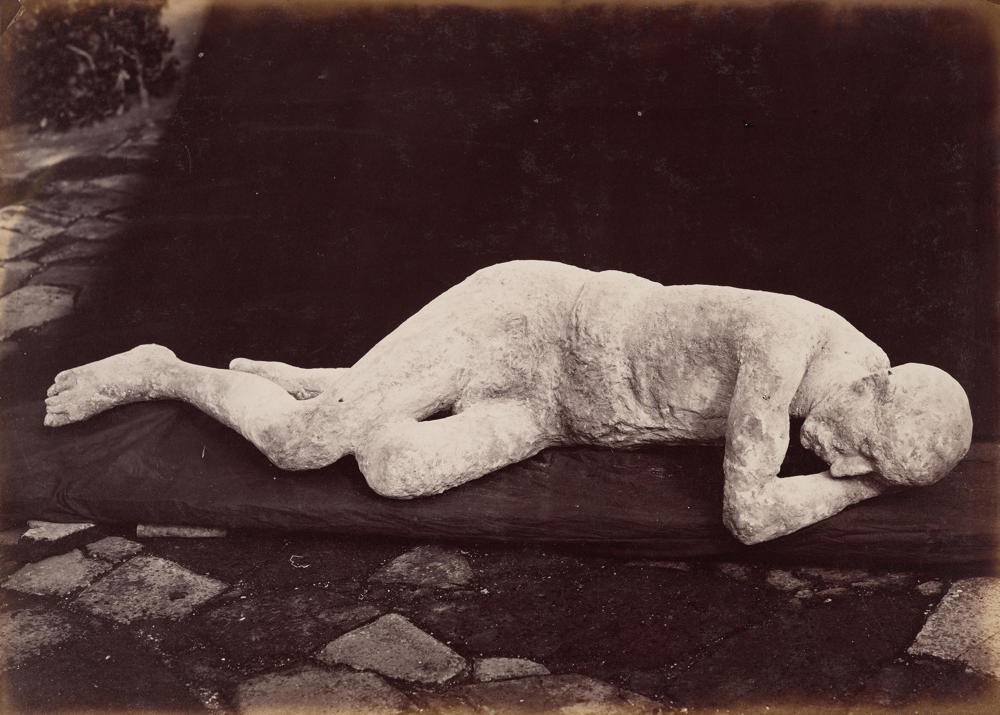
Giorgio Sommer: Plaster Cast of Body, Pompeii (1880)
Resonance Of The Many Contexts
I've learned much about myself and my world in the almost seven years since I began writing a new series each quarter. Fambly will be my twenty-eighth series, my twenty-eighth book-length work since I started Another Summer on the 2017 Solstice. As I've mentioned here innumerable times, my original intention was to chronicle some sense of my manner of living because I always seemed to encounter unanswerable manner of living questions when thinking about my ancestors. They didn't leave very much of a clue about how they lived. I sometimes fear that I've left far too much information, for my descriptions sometimes seem, even to me, scaled a little too close to one inch equals one inch, more detail than could ever prove useful. Still, I figure whoever's interested might just as well have too much as too little information. I didn't start this experiment to starve my future genealogists. Those few scraps of writing in my forebear’s own hand featuring their unique phrasing and misspellings are genuine golden treasures. As I have been reassembling the stories of my forebears, I treasure the contexts I discover more than any other part of their stories. Fambly's much more than accomplishments and dates, but the resonance of the many contexts through which we've passed.
ProgressReport
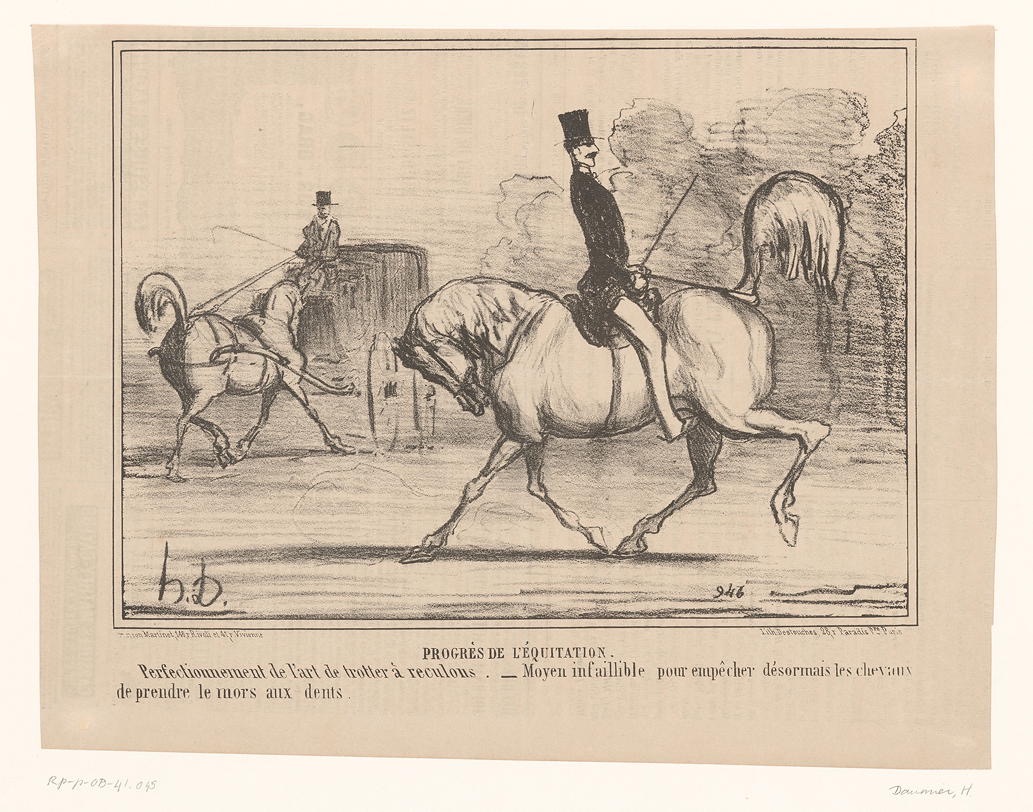
Honoré Daumier:
Karikatuur van een ruiter die achterstevoren rijdt
Caricature of a rider riding backwards (1856)
" … they were engaged in a diaspora away from their Eden …"
Everyone goes through a phase where they find their family an embarrassment. This often occurs during the teen years, when separation seems necessary to affect individuation. We gain the superpower capable of rendering siblings invisible lest we be associated with individuals so unlike us. One genuinely feels they were probably inadvertently switched at birth with some family that already had a color TV. Chores became beyond boring. I seemed to lose respect for myself. If Only became a near-constant refrain as I grieved over my sorry fate. I realized far too late just how fortunate I had been to have been born then, in precisely the right place at exactly the right time. I'd honestly never suspected. I never knew.
It might be true that we're all born into unfathomable ignorance.
APrefectOfGaul
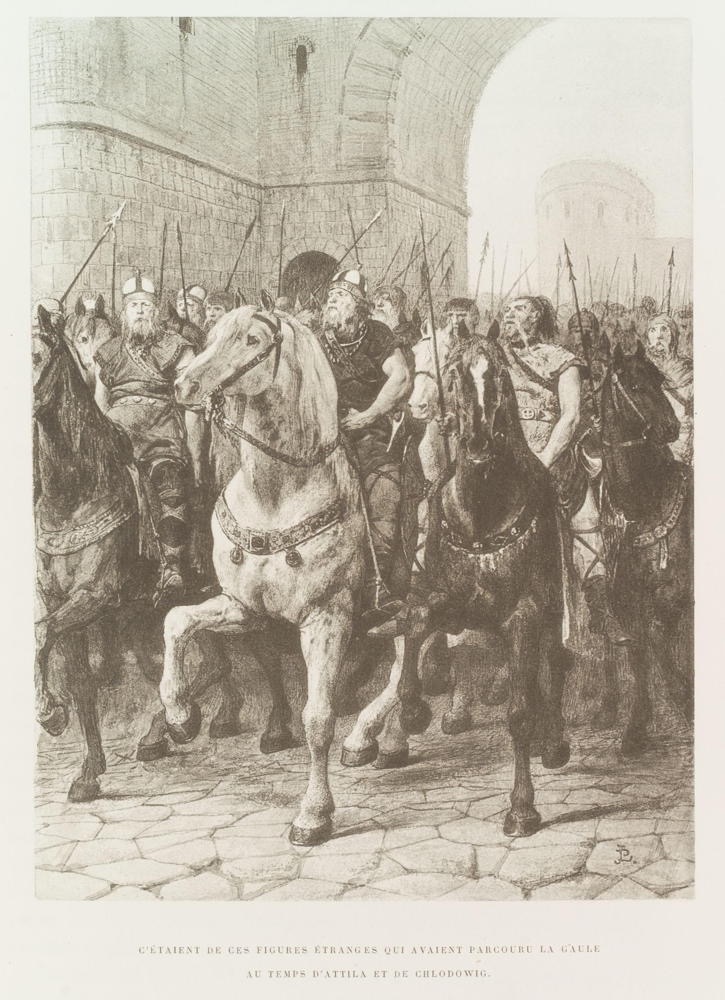
Jean-Paul Laurens:
C'étaient de ces figures étranges qui avaient parcouru la Gaule au temps d'Attila et de Chlodowig
They were one of these strange figures who had traveled Gaul in the time of Attila and Chlodowig (1887)
" … some vestigial memory created forty-seven or eight generations ago …"
My Fambly tree starts petering out around my 47th and 48th great-grandparents. That any record of them still exists amounts to either a significant miracle or a minor research error, though the record had withstood some scrutiny. Contrary to what I'd always heard, the end of the Roman Empire was not some cataclysmic fall. As with all enormous bureaucratic institutions, the end was prolonged and featured unexpected bedfellows. In my notion of that history, ravening hoards tore down walls and took no prisoners. In the real world, even the conquerors understood that vanquishing an army would win much less than half of any battle. The population would need to be governed, and not merely by military dictators, for commerce and trade would continue to be an essential part of any post-status quo arrangement.
My 47th Great-Grandfather seems to have been just such a character, a political operator capable of working across aisles and collaborating with once-sworn enemies to accomplish mutually beneficial ends.
The37thGreat-Grandson
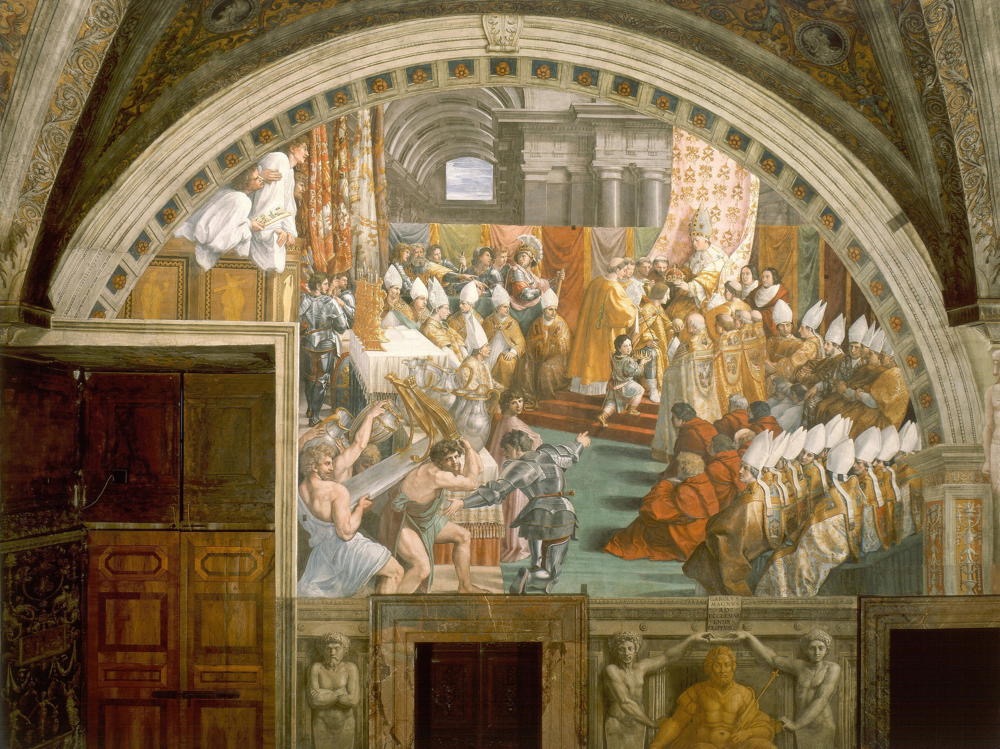
Students of Raphael: Coronation of Charlemagne (1514-15)
"I had better consider myself worthy of all that bother."
His cat awakened the Thirty-Seventh Great-Grandson. He'd taken the day before off to nurse a painful muscle spasm and wasn't quite ready to face the day. The cat insisted. I can confidently report that this cat has our Great-Grandson wrapped around his paws. The Grandson cannot deny him anything, regardless of how shoddily that cat might choose to treat him. He might annoyingly yowl, but the Grandson never loses his ardor for that animal.
Unlike his Thirty-Seventh Great-Grandfather, our Great-Grandson was never instilled via coronation.
Swirling
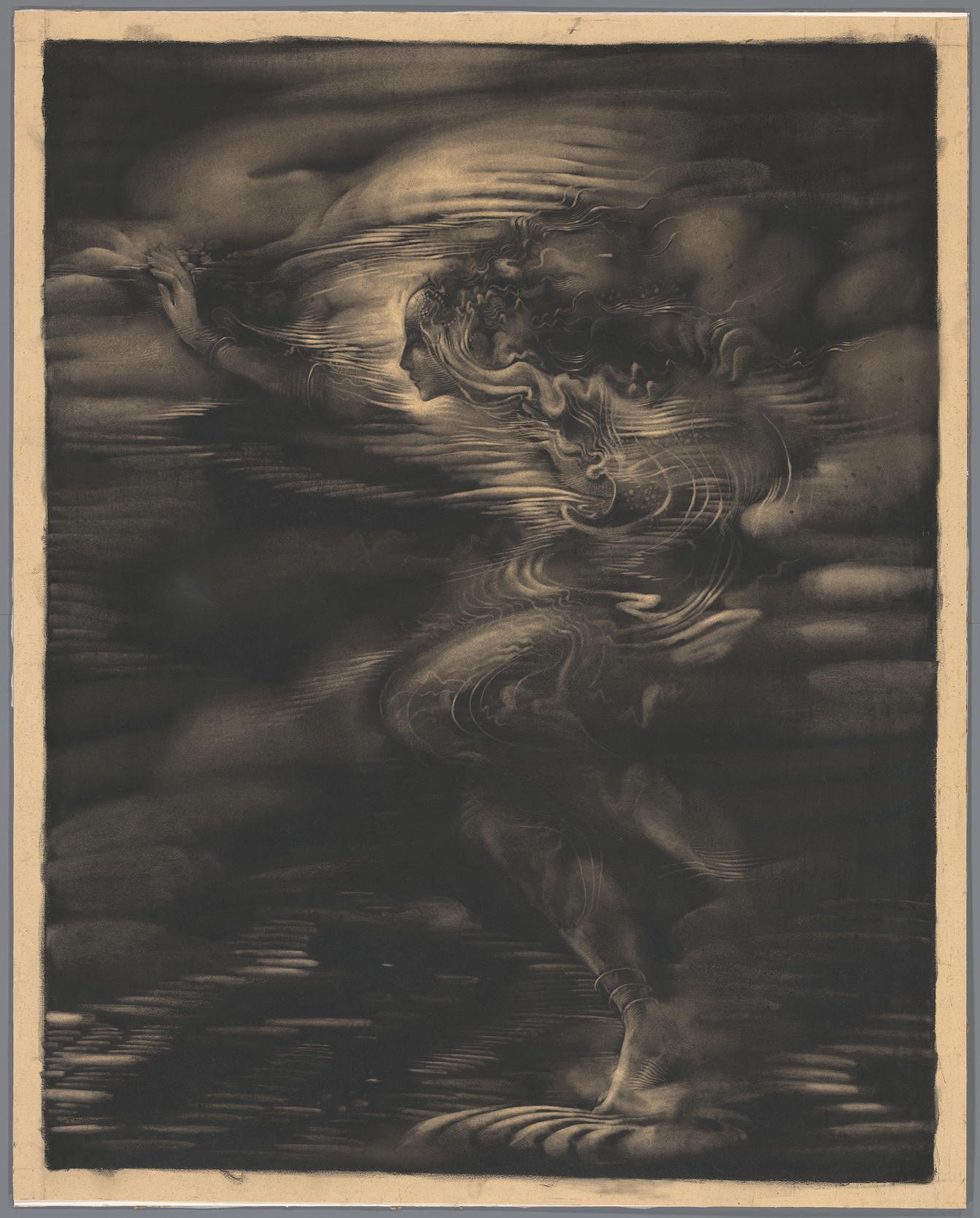
Frans Stamkart: Salome (1910 - 1915)
"This world won't allow what couldn't ever come about."
A point comes when I can no longer comprehend the context within which I find myself dabbling, for I can no more than dabble in the incomprehensible British peerage system. My forebears did not lose all their standing when they were forbidden the right of ascension. They entered the netherworld of dukes, earls, and sirs alien to the American all-men-created-equal creed. Infinitesimal differences seemed to yield enormous shifts. Even seven or eight generations after JohnOfGaunt's era, his X-times great-grandaughters remained in The Peerage, and marriage to them elevated their husband's standing. Through successive marriages, the bloodline migrated to Ireland, where generations of husbands and sons participated in the subjugation of Irish natives.
The British colonized everything they could.
JohnOfGaunt
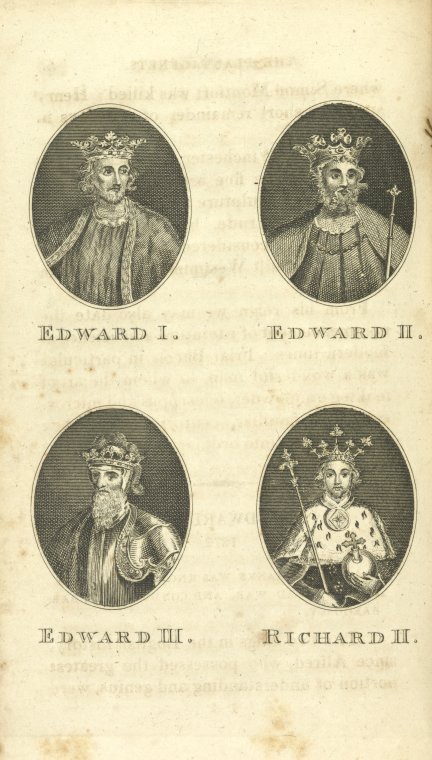
Publisher: William Godwin:
Edward I. Edward II. Edward III. Richard II (1815)
"We're certainly directly related to almost everybody."
How does the progeny of a King and Queen of England manage to lose their rights of association? It was always easy to lose the right of ascension. That required no more than the good fortune not to be the first-born male. The rights of association proved tricker, though, for they depended upon custom and political positioning. Stay in good graces with the crown, and you and your offspring might hang around the household for centuries. Somehow fall out of favor, and you and yours will disappear, sometimes into formal exile and other times more permanently. There seems to have been little permanent sentimentality between members of the upper reaches of royal society. Anybody—and I do mean anybody—could be excommunicated on any premise on the whim of a king, queen, or even senior advisor. Not even offspring were necessarily excepted.
Rejected ones could try again by attempting to marry themself off to some handy neighboring monarch.
Eleanor-of-Castile
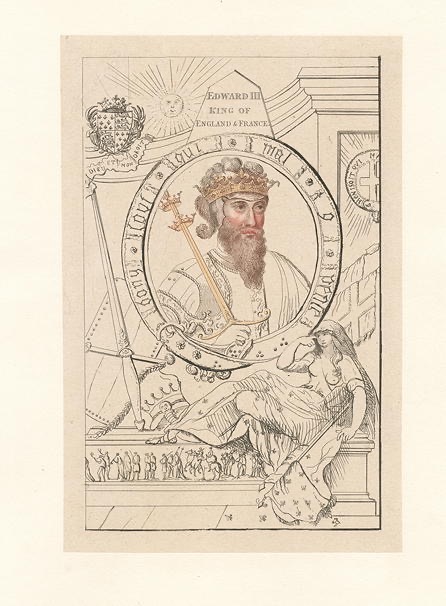
Print: Edward III, King of England and France (1817)
"I might just as well consider myself not even distantly related."
My twenty-first great-grandmother was twelve or thirteen when she married the love of her life, himself only fifteen at the time, and future king of England, on November 1, 1254. Eleanor of Castile qualified as genuine royalty with an ancestry dating back centuries, from before the beginning of the Dark Ages to around 500 AD, starting with a Prefect of Gaul and disappearing into doubtless royal parentage before. Since then, her forebears had fulfilled roles as varied as manager of an early Frankish Duke's household to kingships in what would later be Germany, France, Spain, and Portugal. If anything, my Fambly's history speaks to the absolute absurdity of generational wealth. Edward and Eleanor were perhaps the wealthiest monarchs in British history. A few offspring by mistresses and great-grandchildren don't receive any split of King great-Grandpa's pot. A few patricides engender hard feelings, especially within the immediate family.
Eleanor bore Edward III's first child at thirteen while still on her honeymoon.
Weekly Writing Summary For The Week Ending 4/18/2024
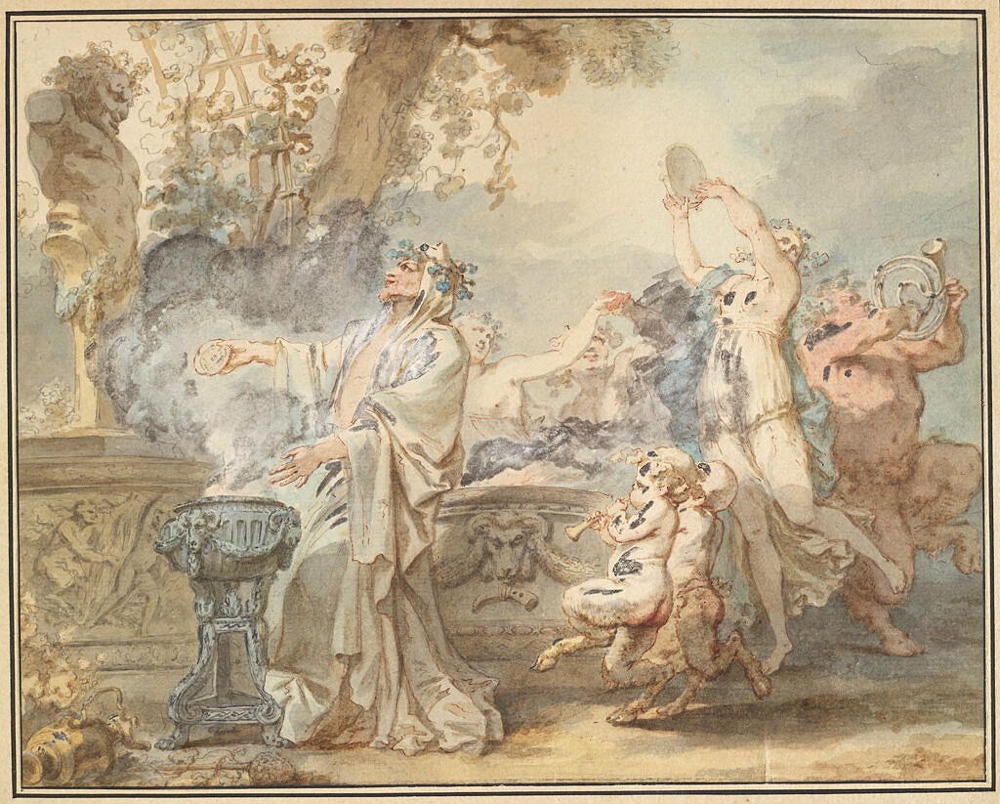
Jacques-Philippe Caresme:
Priest Making an Offering Accompanied by Nymphs and Satyrs
(18th century)
They Become More Real
I’m starting to believe that history might mostly be about patterns. Individual stories and actions might matter most when reduced to patterns. One instance might prove entertaining, but a half-dozen similar stories spread over centuries might better inform. I’ve been stumbling into possible crossovers, where one great-grandfather ended up in the same place and time as another and where every damned family that followed that trail ended up with almost the same story. These revelations shift my attention away from accomplishments toward responses. It might be that The Cumberland Valley, for instance, provided a context that tended to tease out the same behaviors from a variety of different people, that it might not have mattered what historical place your family hailed from or what religion they practiced, but that they fell under the subtle influence of a place they happened to share. I wasn’t there, but their stories sound more than accidentally similar. They almost seem like they were pulled from a book of valid plot lines or merely works of fiction. They become more real once they start showing their similarities.
SideTrips
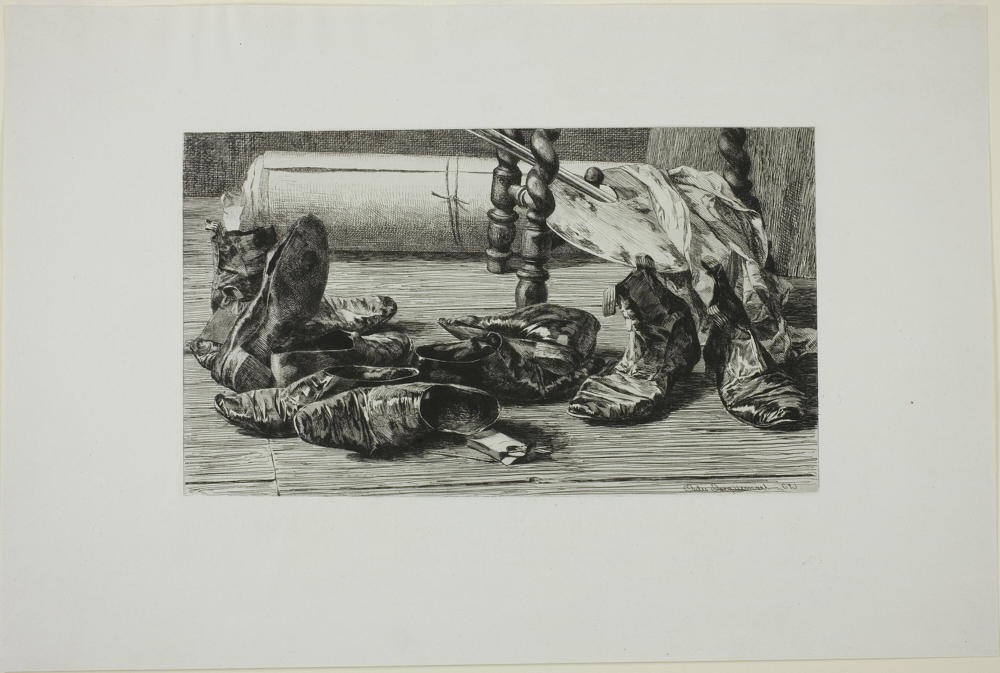
Jules F. Jacquemart: Mementos of a Trip (1862)
" … they insist we were all created equal."
Every forebear contributed their share of what eventually became me. My mother and father provided equal amounts of each of themselves as their parents did before them. Likewise, their grandparents did their part, too, and their parents before them. Over succeeding generations, a single generation's contribution gets diluted, but the formula holds. My twentieth great-grandmother contributed just as much as my twentieth great-grandfather. Yet, I tend to follow the family name backward rather than engage in many SideTrips to see what my umpteenth great-grandmother's family might have provided. Not every SideTrip goes anywhere, for only the elites ever inherit much of a family tree. It takes notoriety to guarantee that anybody remembers anybody, that, or a string of very conscientious and fortunate grandmothers. This kind maintain records in bibles and never loses their homes to fires. It's a wonder many records survive at all.
I felt curious about my second great-grandmother, Elizabeth Lovelady, who died in childbirth along the Applegate extension of the Oregon Trail on November 13, 1845, leaving my great-grandfather John Bird Bounds an orphan at twelve.
BoundUp
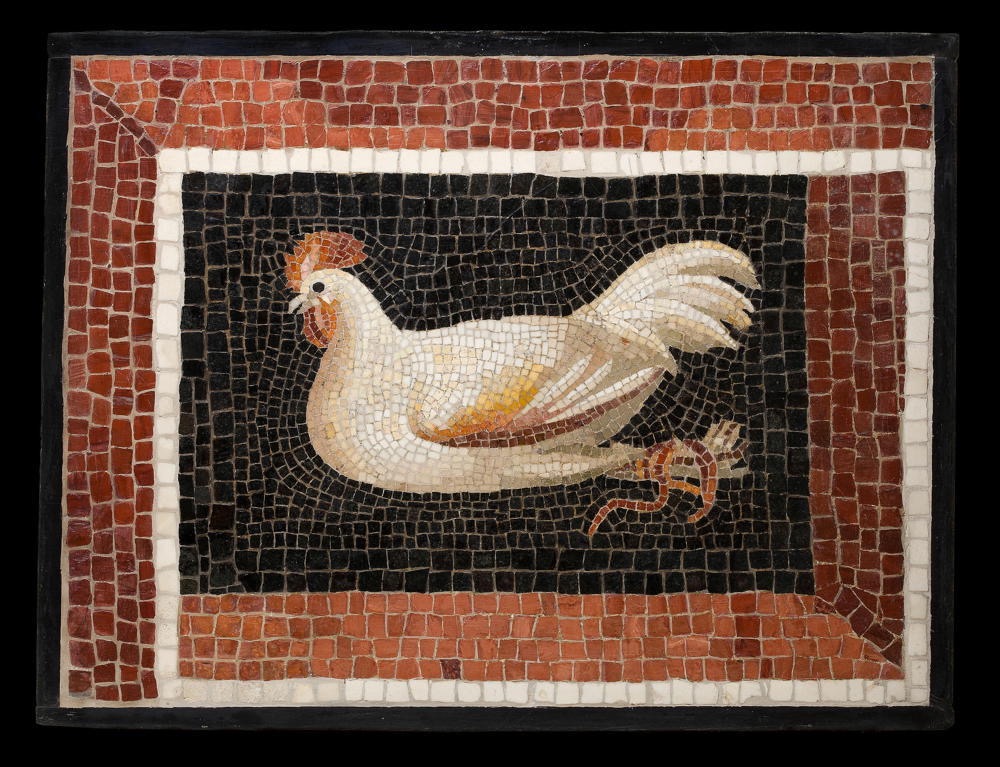
Roman; Rome, Italy: Mosaic Floor Panel Depicting a Bound Rooster
(2nd century)
" … so I almost fervently imagine."
I cannot definitively declare anything about my paternal grandmother's family. Everything I ascertain seems based upon questionable scholarship, the result of seekers perhaps desperate to confirm their most craven convictions. Everyone secretly believes their family comes from royalty. Everyone imagines they're due some long-lost inheritance. Everyone imagines they come from noble characters, dukes, and dutchesses if not grand viziers. It sometimes even seems clear how to get there from here. Just log into Ancestor.com and follow the threads if you can. Nobody adequately imagines how much speculation went into those records and how little source documentation was ever discovered. Those who retain old family bibles might have the best documentation possible. Still, in the case of those immaculate births where the offspring seemed remarkably mature for a newborn, even the Good Book might contain fiction, if for all the very best reasons.
So, I try to take my discoveries with hefty spoonfuls of sand.
Leaps&Bounds
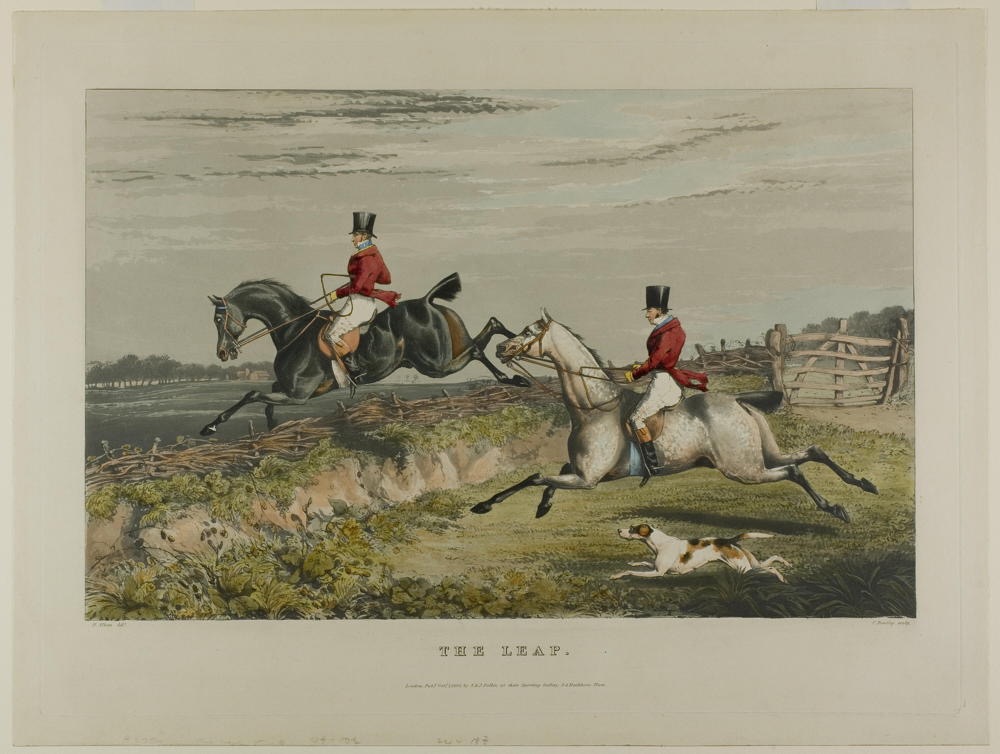
Charles Bentley: The Leap, from Fox Hunting (1828)
"She ultimately came to carry even her trauma well."
Caroline (Carrie) Pat Bounds, my paternal grandmother, was nobody's notion of aristocracy in action, though her ancestry strongly suggests aristocratic blood. Belief in the supremacy of aristocratic ancestry seems to be similar to believing in white supremacy or any inheritance-based privilege. These were stories concocted to encourage acceptance of other than democratically-elected rulers. Science suggests that genius does not run in families, though enough examples convince most that it certainly must. I swell with pride when I imagine my German genes giving me an advantage. As the history of paternal hierarchies demonstrates, good governance was never inheritable; neither was good sense. Each generation brings certain privileges and deficiencies into play. Very little's ever decided on day one.
The environment one's raised in might better determine later successes and failures, but ample stories suggest that almost anyone can overcome nearly anything in this life.
GilliamCounty
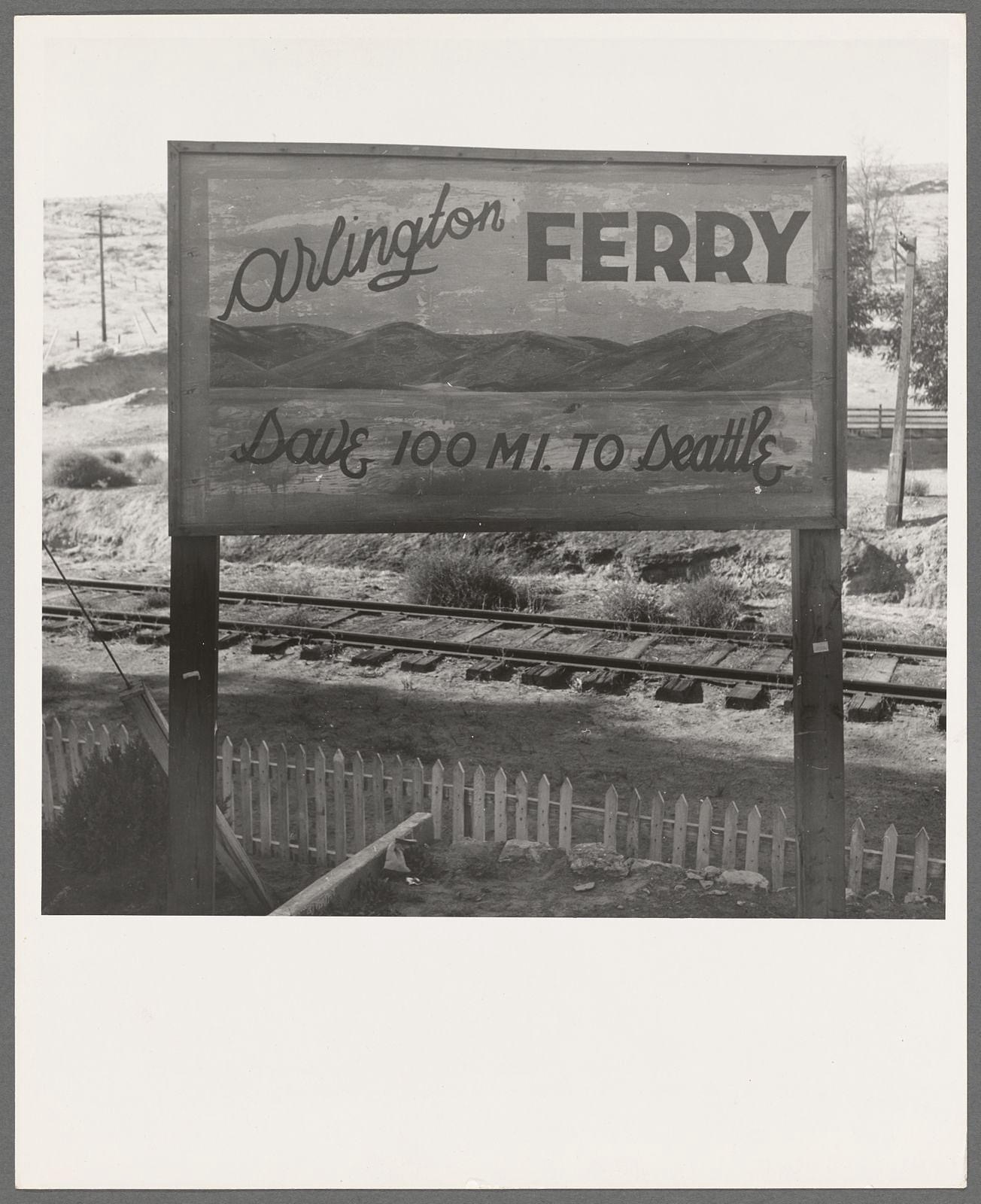
Dorothea Lange: On transportation outskirts of a small Oregon town
on the Columbia River. Arlington, Gilliam County, Oregon (1939)
"Those churches held the records."
My second great-grandparents were mostly late arrivers in Oregon. Those who weren't late arrivers found their farm after lengthy delays. Somewhere around 1885, Alonzo Kenaston and Maria (Seward) Kenaston finally returned to Oregon after their thoroughly discouraging honeymoon trip in 1865, this time by train. They'd homesteaded in the Nebraska Sandhills after dropping four children in Illinois and Missouri, including my great-grandfather Luther, in 1875. Four more in Nebraska, only two of whom lived, left them with five kids ranging from twenty-one to two by July of 1886 when Alonzo finally died of His Troubles, the effects of the Rheumatic Fever he'd contracted while marching barefoot in the snow during the Civil War. They'd finally realized their dream, acquiring acreage on Buckhorn Road just West of Mayville, Gilliam County, Oregon.
Another set of second great-grandparents had recently acquired the land next to the Kenaston spread.
TrackingProgress
![]()
Julius Gari Melchers: Mother and Child (c. 1906)
"This world moves exclusively in mighty mysterious ways."
I can track my forebears’ migrations by noticing where they dropped their babies. Those prior generations seem to have been constantly on the move, though vagaries of time might better explain their apparent restlessness. I can relive a decade in a minute, but they lived it a minute at a time. The births maintained a background rhythm that seems extraordinarily regular today. Another child would appear every eighteen to twenty-four months, most with a birth location attached. By tracking where and when those babies arrived, I easily visualize a map of their progress. They generally kept moving West, with settled periods of varying lengths. My fourth great-grandfather, James Emsley Mayfield, returned to Central Tennessee from his birthplace in Albemarle, North Carolina, and raised his family there in apparent proximity to his extended family. Born just after The Creek killed his father in 1780, he lived until he was 75 and died in 1855 in Montgomery County, Illinois, near the end of what was known as The Great Highway, the primary route between the headwaters of The Potomac in Maryland and The Mississippi.
Interestingly, that country was where James Emsely Mayfield's father had served with William Rodgers Clark in The Revolutionary War.
AndrewJackson
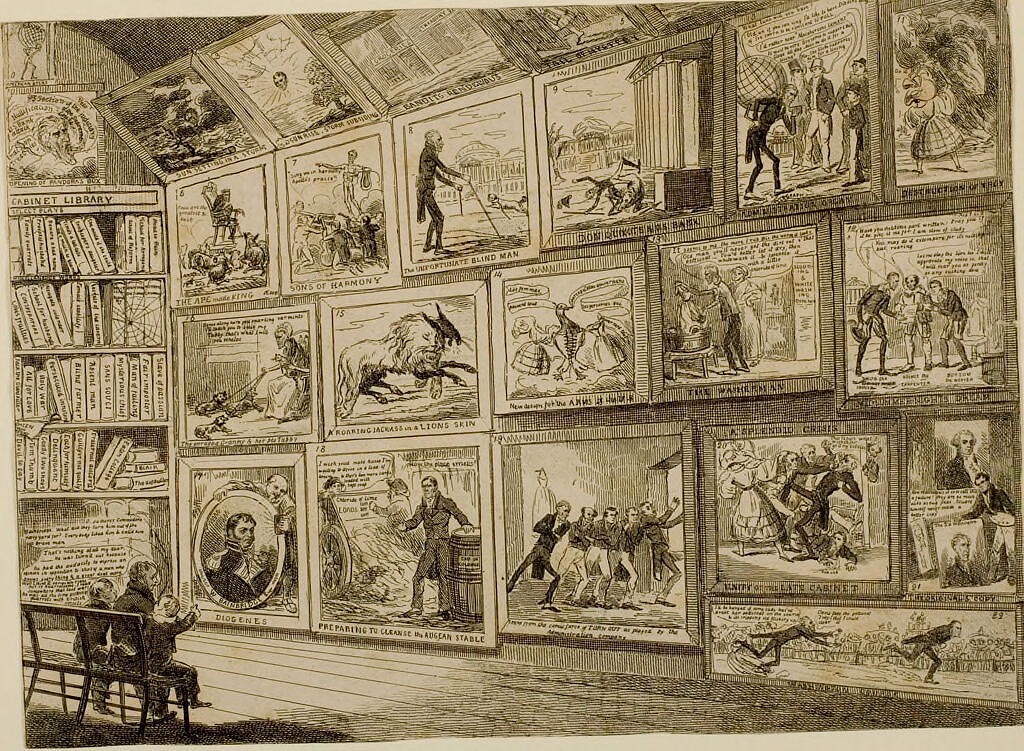
David Claypoole Johnston:
Exhibition of Cabinet Pictures: Satire on Andrew Jackson (19th century)
" … this swirl of stories constitutes adequate justification …"
I've long wondered why two of my great-grandfathers were named Andrew Jackson Mayfield. What must have moved the senior AJ's father, James Emsley Mayfield, to name his firstborn after that future President? What experience could have been so significant to move that son to name one of his sons similarly? The answer might lie in where AJ senior's grandfather, James M. Mayfield, my fifth Great-grandfather, settled after he slipped over the Cumberland Gap and into Indian Reserve territory sometime before 1780.
Mary Carter's book Fifteen Southern Families states, "The Mayfield family all seemed to have been of the caliber of Daniel Boone, David Crockett, and other frontiersmen.
Weekly Writing Summary For The Week Ending 4/11/2024
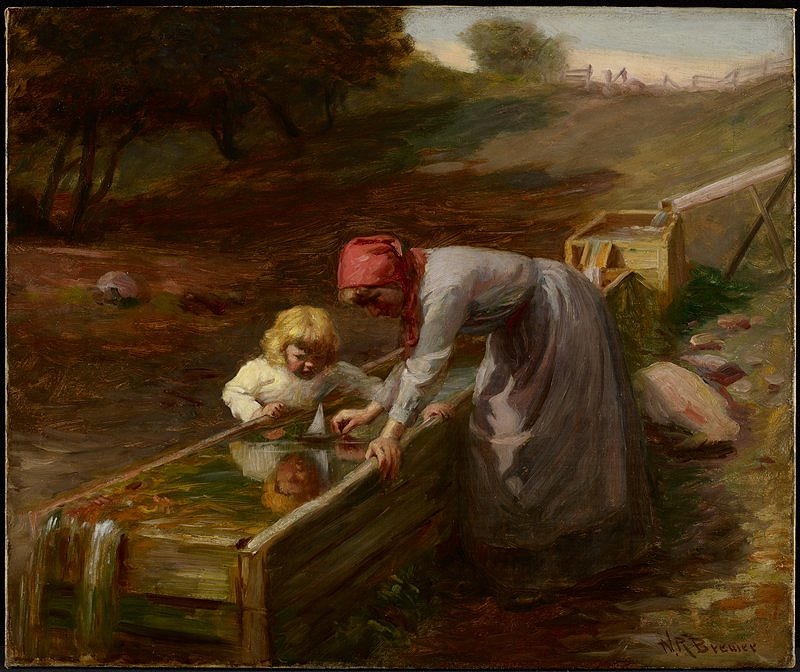
Nicholas Richard Brewer: At the Spring (c. 1895)
How Utterly Renewing!
It must be that expanding one dimension also expands others. Shoving deeper into the past might naturally nudge further into some future, too, like one of those graphic images with 'preserve dimensions' enabled. When I push my Fambly history further into the past, my future seems to extend itself in sympathetic balance. The result broadens, deepens, and heightens to keep all dimensions in synch. The result seems like a net expansion but with much less effort than expected. I shove one single edge, and the rest harmoniously maintain their relationship relative to me. Who knew that delving into history might invoke principles of physics? My world seems in ever greater balance as a direct result of my effort to dot a long naked 'i' and advance what I figured needed to be advanced. There will be no finish. Finishing could not possibly be the purpose of this series. I have been discovering myself in the stories I've been uncovering. Blow off the moss and rust, and they might be as fresh as they ever were. My history, like yours, presents as extended metaphors. I dare not interpret the least of them literally, yet I dare not interpret them in some way. How utterly renewing!
RatHoling
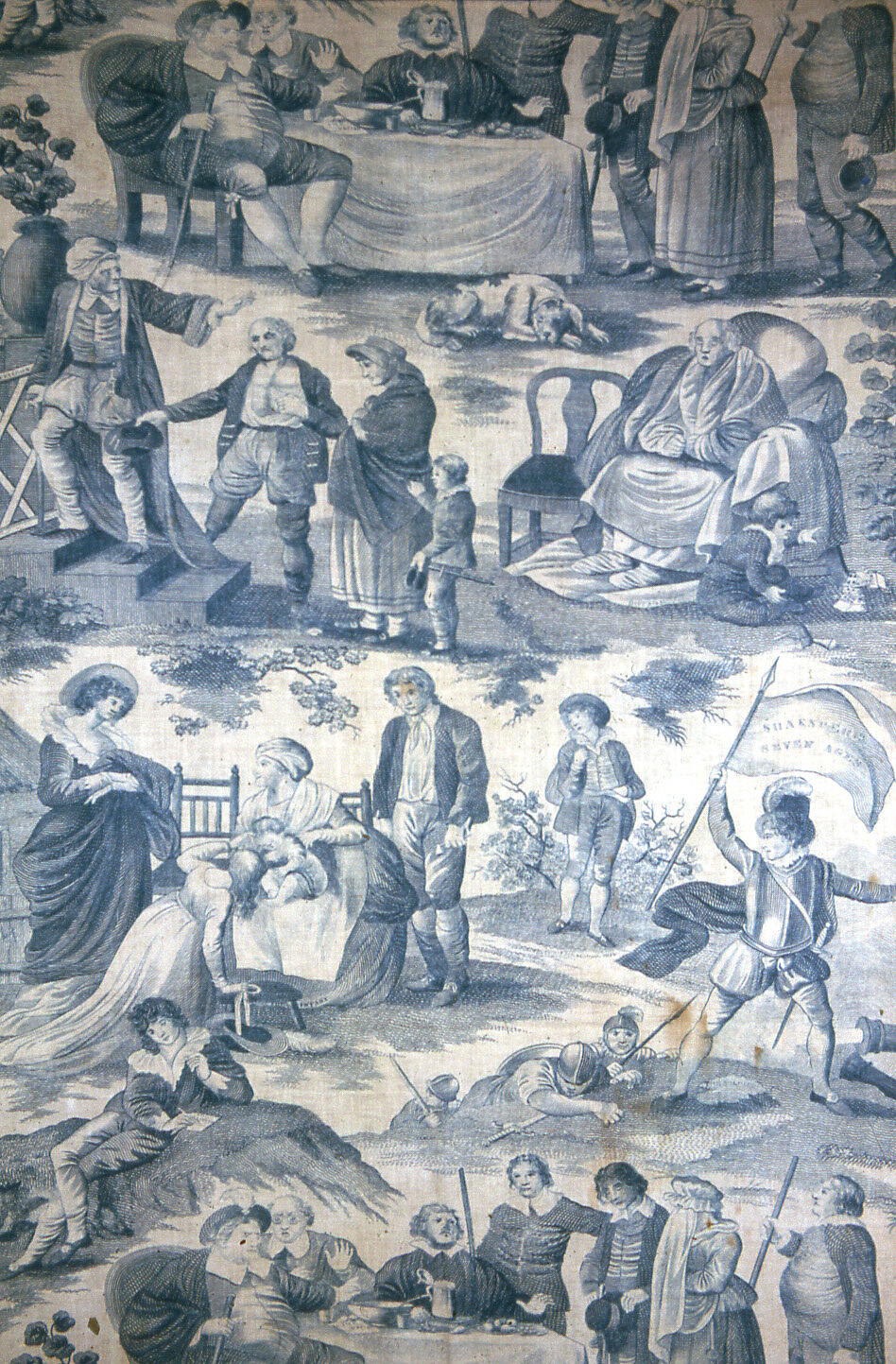
Engraved by John Slack:
Shakespeare’s Seven Ages (c. 1805)
"You may now safely refer to me as "Sir."
I'd always felt bothered that I had so little information about the Mayfield family's background. My Great-Grandmother was a Mayfield before she became a Kenaston, and I had a wealth of stories about the Kenaston clan. The Mayfield story petered out in the South just before the Civil War. I suspected they were separationists and Confederates, though, because two generations of the line, my 3rd and 4th Greats, were named Andrew Jackson Mayfield. My stories about them went no further. I suspected them of Southern sympathies during The War because they'd lived in Tennesee, and the elder Andrew married a woman from Georgia. I understand why my forebears revered Andrew Jackson. They loved him because he refused to shine a British Officer's boots during The War of 1812, then routed them out of New Orleans. They probably liked him better because he helped open land for settlement in Florida and Georgia, west to the Mississippi, killing or exiling the natives. His Trail of Tears was cause for enthusiastic cheers for those would-be pioneers waiting for openings from East of the Alleghenies.
So, I started following the stories and checking a variety of sources.
NewAmsterdam
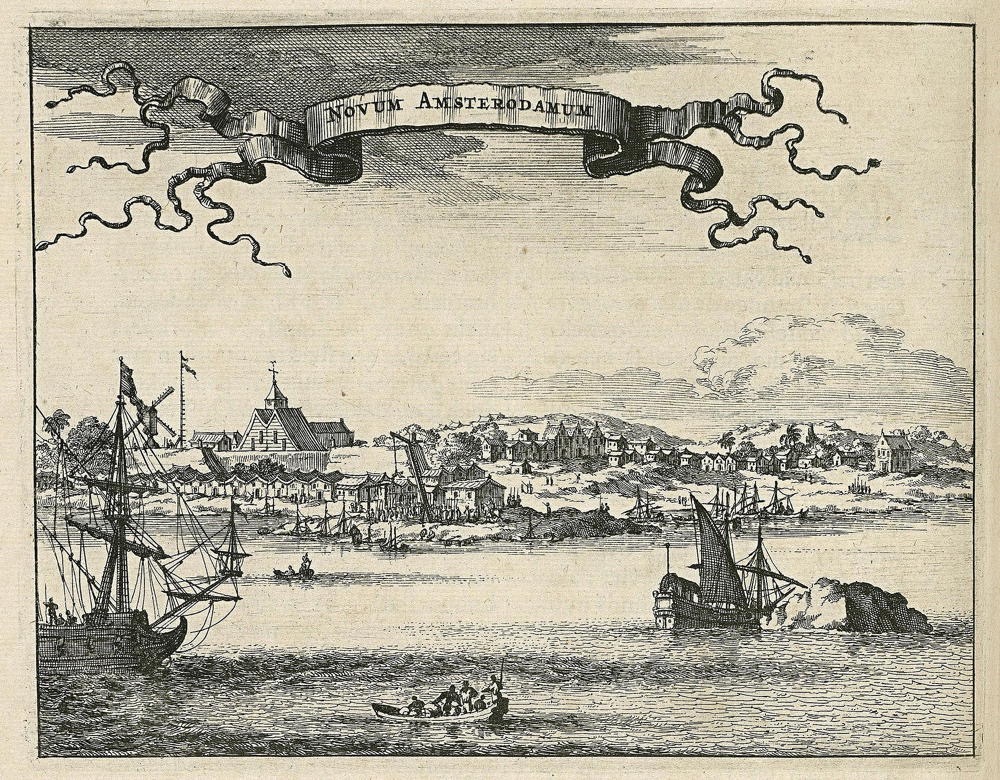
Jacob van Meurs: View of Nieuw Amsterdam.
Novum Amsterodamum (1662)
" … there were many mysteries involved in their history."
The Northern Netherlands began building their foreign trade early in the seventeenth century. They were late to the party. England, Spain, and even Portugal were well ahead of the Dutch in creating colonies. The Dutch weren't even a complete country yet, for they had split themselves in trying to separate from Spanish domination, the Southern portion of the country still Hapsburg Catholic clinging to Spain and the Northern part just exploring an identity as an independent nation. They were still trying to invent an identity when their Dutch West India Company began exploring territory in the New World: New Netherland. A contract English captain, Henry Hudson, investigating the possible existence of a shortcut to the Far East, "discovered" The Hudson River, resulting in a Dutch fur trading settlement in what would become Albany, New York. Manhattan, adjacent New Jersey, and Long Island were likewise claimed as New Amsterdam.
By 1636, The Dutch West India Company was importing contract laborers to colonize this territory, including my tenth great-grandfather Cornelis Aertsen Van Schaick.
Evan&Sara
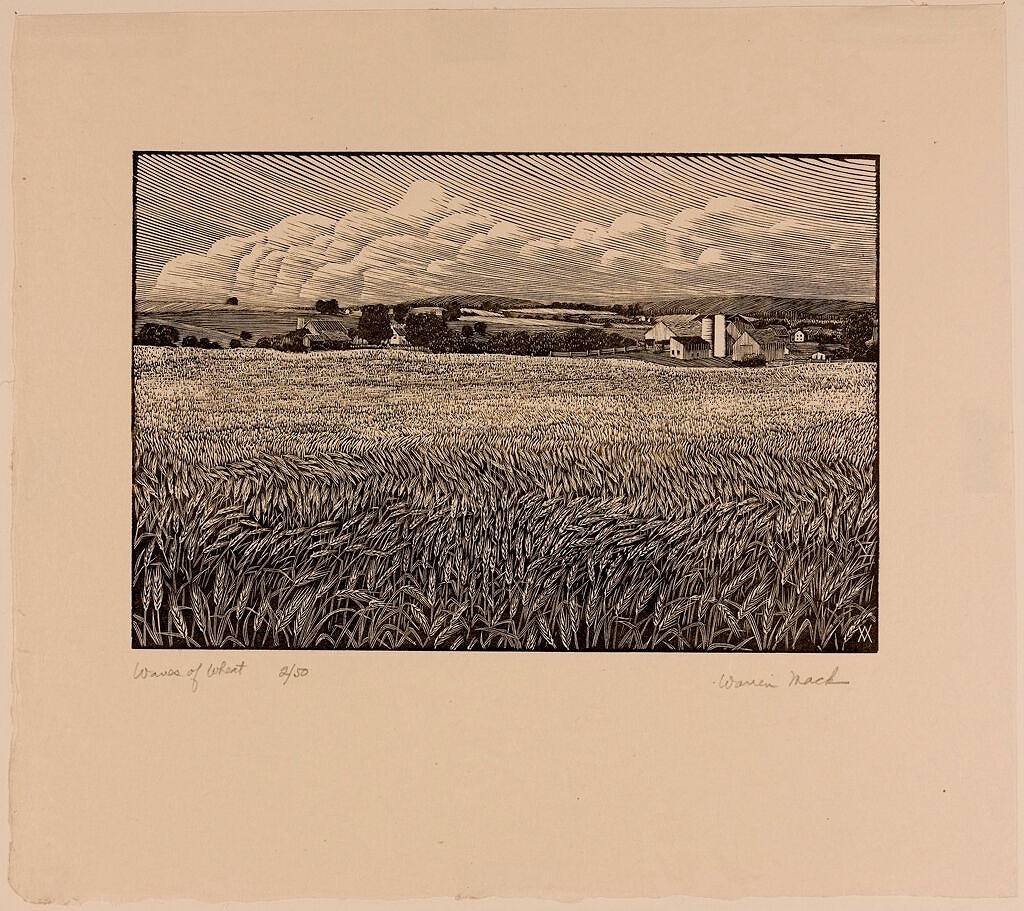
Warren Mack: Waves of Wheat (20th century)
"It should be no wonder."
According to a history written by their daughter Ada, my 2X great-grandfather Evan Arthur Wallace, born in Marysville, Iowa, in February 1847, married my 2X great-grandmother, Sara Adeline Jackson, born in March 1851, on August 16, 1868, at Lovilia, Iowa. They moved onto a farm situated between Lovilia and Albia, Iowa, where they brought three sons into the world: Theodore Penn (1869), my great-grandfather Nathaniel Parker (1871), and William Elmer (1874). When Elmer was three weeks old, they left Iowa with all their belongings that they could carry in a buckboard and set out for Fort Dodge, Iowa, intent upon joining an emigrant train bound for Salt Lake City. They expected to buy a covered wagon, supplies, and tools, then travel overland to Dayton, Washington. Reports of "Indian trouble" along the route convinced them to take an overland stage instead. "There were no roads, just wagon tracks, and driver knowledge. Women and children rode inside the stage while men rode on top with rifles at the ready." They were frightened by Indians twice, and at The Great Oregon Divide, women and children left the stage to walk rather than ride over that narrow passage.
The stage took them to Walla Walla.
CreatingHistory
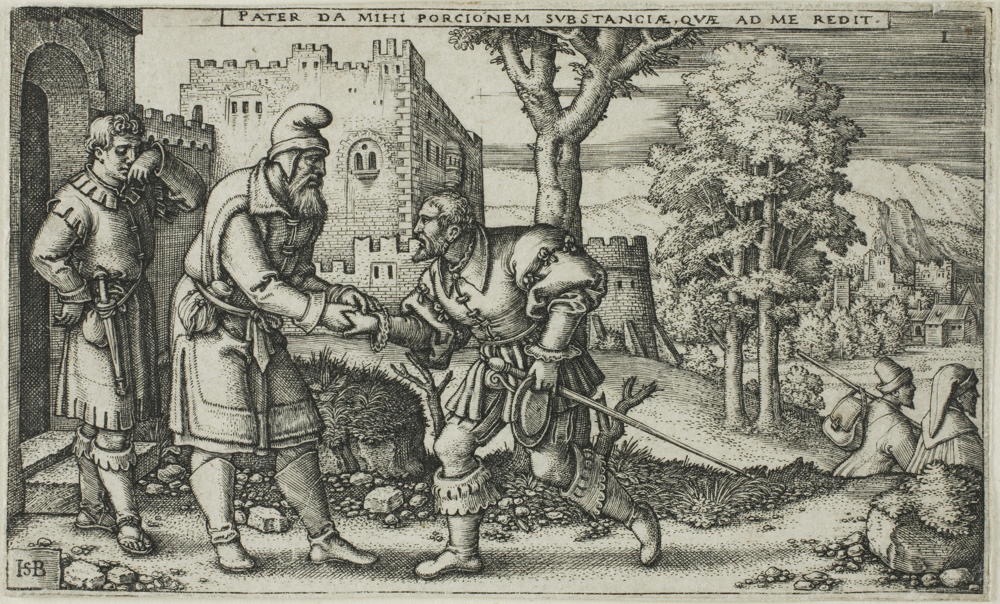
Sebald Beham:
The Departure of the Prodigal Son,
plate one from The History of the Prodigal Son
(Early Sixteenth Century)
"We are actively, if extremely subtly, becoming the very stuff of our transcriptions …"
It seems unlikely to me that I am at this moment CreatingHistory. I began creating this Fambly history under the mistaken impression that I would just be transcribing previously assembled information when it seems more likely that I have been CreatingHistory instead. I realize that this unfolding story had never been told before now. Oh, bits and pieces of it have certainly previously crossed lips, but never these particular configurations. The stories sure seem familiar, but they include fresh particulars. It seemed that every time I told a story, it became different. I can't quite claim to have been the source material, but I must admit I significantly changed it in assembling it, I included some speculation but tried to clearly identify when I was guessing. I wasn't really creating my history, but my Fambly's. Still, I must admit to having been the author.
Where does history originate?
TheWallaceProblem
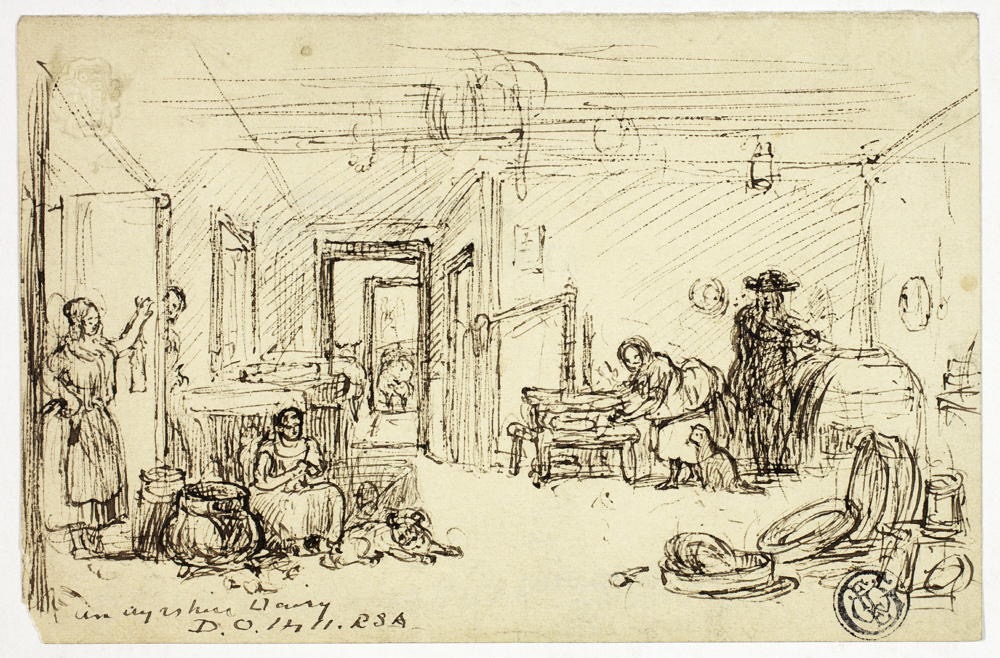
David Octavius Hill: In Ayrshire Dairy (1822-1870)
"Geneology seems indistinguishable from vanity … "
My mother's maiden name was Wallace. Wallace ain't quite Smith, but it seems an uncommonly common name. People wondered if she was related to THE Wallace, the one depicted in Braveheart. There's plenty of genealogical information on the Wallace Clan, and I can employ the term 'clan' because it's an authentically Scottish surname, as Scottish as Burns or Bruce. The wealth of information brings both ease and complication. The fame has attracted hoards of researchers before me, and they've left the rough equivalent of a muddy trench where a path might otherwise lie. Almost every query quite naturally slipped into that trench. Before I knew it, I was twenty-eight uninterrupted generations back to the true Patriarch of every Wallace since: Elmerus Galeius of Wales around 1100. That such a quintessentially Scot hailed from Wales carries no wee dram of irony. I suspect such contradictions underlie some of what the world recognizes as the Scottish attitude.
I feel suspicious of my own research.
Patriarch
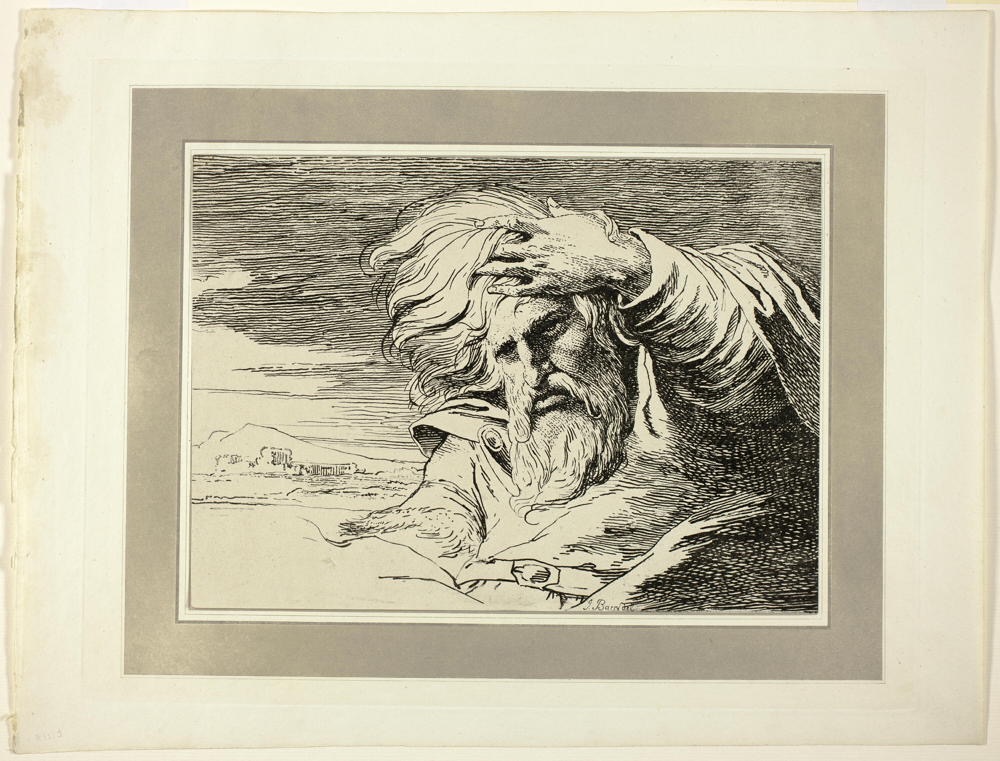
James Barry: Eastern Patriarch (1803)
"sate in stocks for railing."
Patriarchy can prove to be slippery to determine. In some ways, each generation produces a patriarch, though some generations produce especially noteworthy ones. Those who serve as the center point of a grand convergence or the point of exceptional dispersal most often earn the label. In practice, assigning this title must surely prove arbitrary, with little besides opportunity or convenience deciding. In the Kenaston clan, I choose to name John Keniston, my 8th great-grandfather, born in 1615 in Manchester, England. (Spellings were fluid then; Keniston remained with an 'i' until around 1700 when the 'a' replaced it.) He arrived in Dover, Massachusetts Bay Colony, in 1623 at the age of eight. His parents, Henry and Elizabeth Leeze, and his sister, Mary, and brother, James, died of "The Sickness" shortly after their ship, Margaret and John, arrived.
At age thirty, in 1645, he married Agnes, daughter of The Reverend John Moody, and settled into the fishing village of Strawberry Banke, now known as Portsmouth, New Hampshire.
Weekly Writing Summary For The Week Ending 4/04/2024
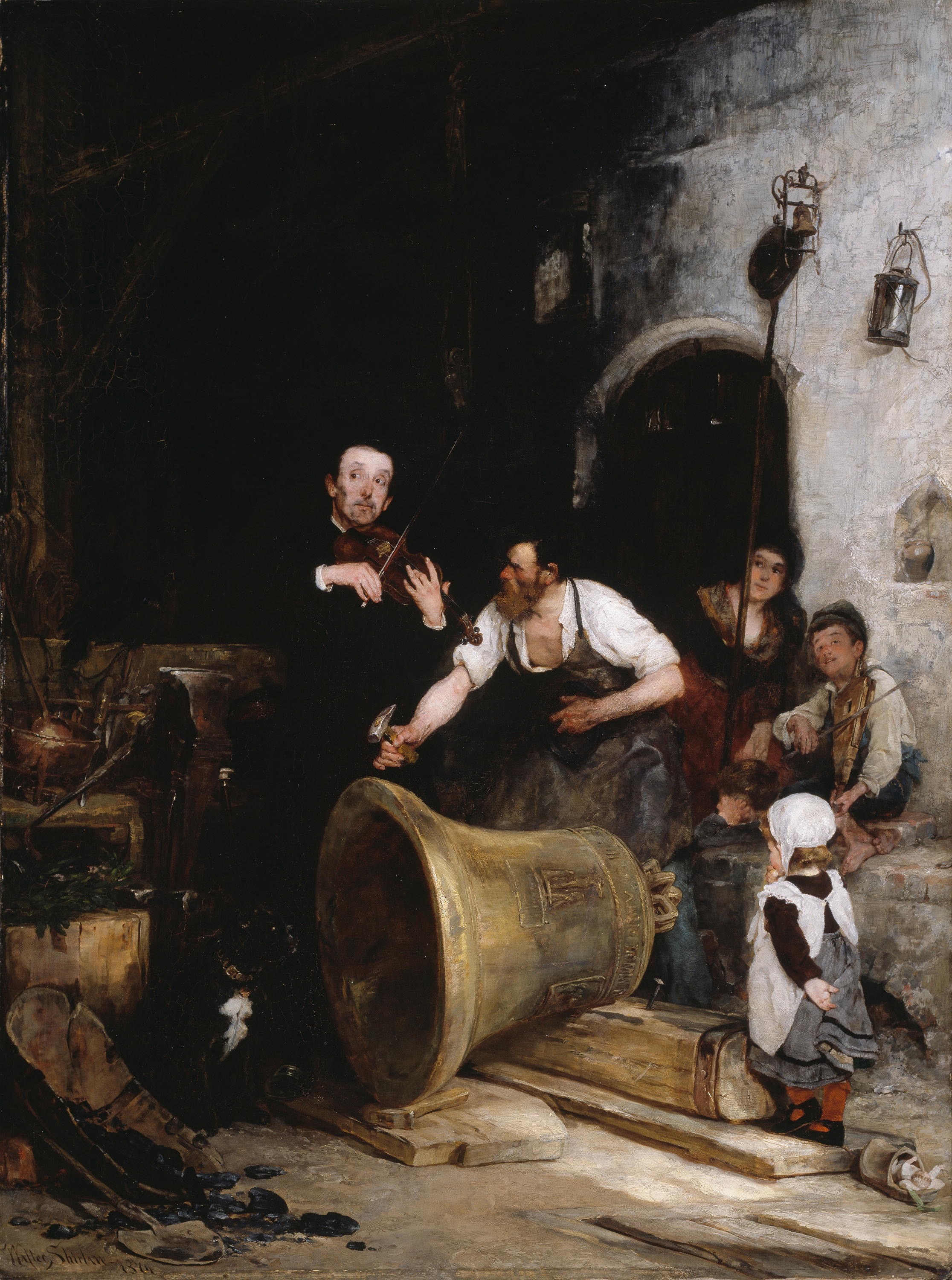
Walter Shirlaw: Toning the Bell (1874)
I Couldn't Possibly Be Any Different
The seasons shifted and I find myself already past Easter, past Passover, and screaming toward summer. The distress the receding winter visited upon me was unremarkable in retrospect, though it seemed anything but unremarkable as it was passing. Retrospection rarely carries any existential dread. It sugarcoats experiences and unavoidably misrepresents. As I create these Fambly histories, I remain almost painfully aware of all I cannot capture in them. I might curse the incompleteness I encounter in the surviving records while acknowledging that I am choosing not to mention some details. I attempt to capture essences without knowing what might comprise them. Merriweather Lewis believed dread to be an unforgivable sin. He insisted that he should move forward without much concern about the immediate future. That will sort itself out without anticipation. I might productively progress into indifference, too, interested in how my story unfolds and confident that I'm capable of coping with whatever unfolds. The historian seeks to know what happened next but dares not dwell too much on precisely where he's propelling himself. Not one of my forebears ever once knew how their stories would turn out. I might accept that I couldn't possibly be any different.
Kenaston
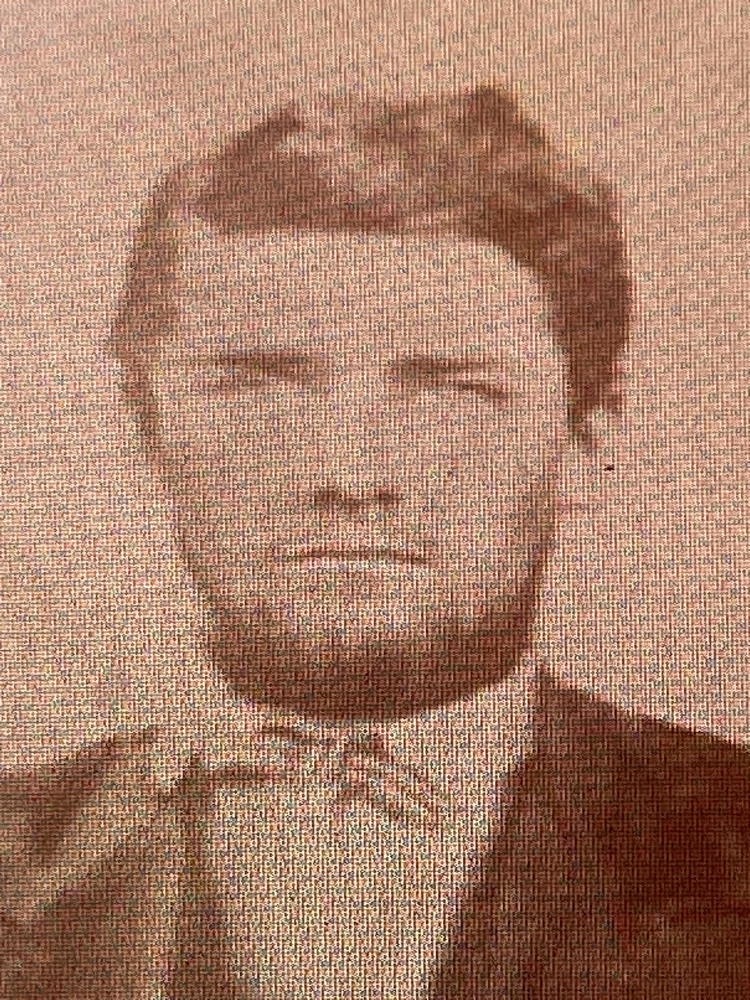
Alonzo Trembel Kenaston
1843 – 1886
My 2X great grandfather
"History seems to happen exclusively by accident on purpose."
All of his adult life, my two times great-grandfather, Alonzo Trembel Kenaston, suffered from a condition he referred to as his Troubles, which began with his service as a nineteen-year-old in the Army of the Cumberland's Kentucky Campaign in the Autumn of 1862. He was a fresh recruit from Illinois with only three weeks of training before he marched into Kentucky to chase Bragg's Confederate force out of the state. The campaign achieved its objective, but at ruinous cost; the Union lost battles but managed to scare off its opponents with sheer numbers. The march proved ruinous enough, that country having suffered through the summer drought, leaving little water for fifty-five thousand Union and seventeen thousand Confederate troops. The campaign became a pursuit for the Union, hampered by rough and hilly terrain culminating in an unseasonal wet snowfall, which left the barefoot troops at great disadvantage.
Seward

John Bunyan:
The pilgrim's progress, frontispiece (1684)
"Time exclusively moves in both tiny and enormous increments."
William Seward and his wife Grace (Norton), my eighth great-grandparents, arrived from England in what would become Guilford, Connecticut, in the late summer of 1639. They were genuine pilgrims and pioneers. They slowly built a town that eventually spread beyond the land they'd initially purchased from the female chief of the local natives. Tensions built over time. They and their son John survived King Philip's War, a two-year tangle between colonists and local natives that left a thousand colonists dead and more than two thousand natives killed or enslaved. In 1682, the second generation of native North American-born Sewards arrived, John, Jr. He would start a migration further North. My fifth great-grandfather, Aaron, John Jr's tenth child, would marry Elizabeth Clark in Granville, MA, in 1757, then serve in the Revolutionary War, father nine children, and end up in Kortright, New York. I suspect he received a land grant for his service in the war. The matriarch Grace's headstone remains legible, built into a fine wall constructed in Guilford when the original burying yard and town square were repurposed. They had prospered.
I used to believe that my Sewards were somehow related to President Lincoln's Secretary of State because that Seward also hailed from upstate New York, but I was mistaken.
Spokes
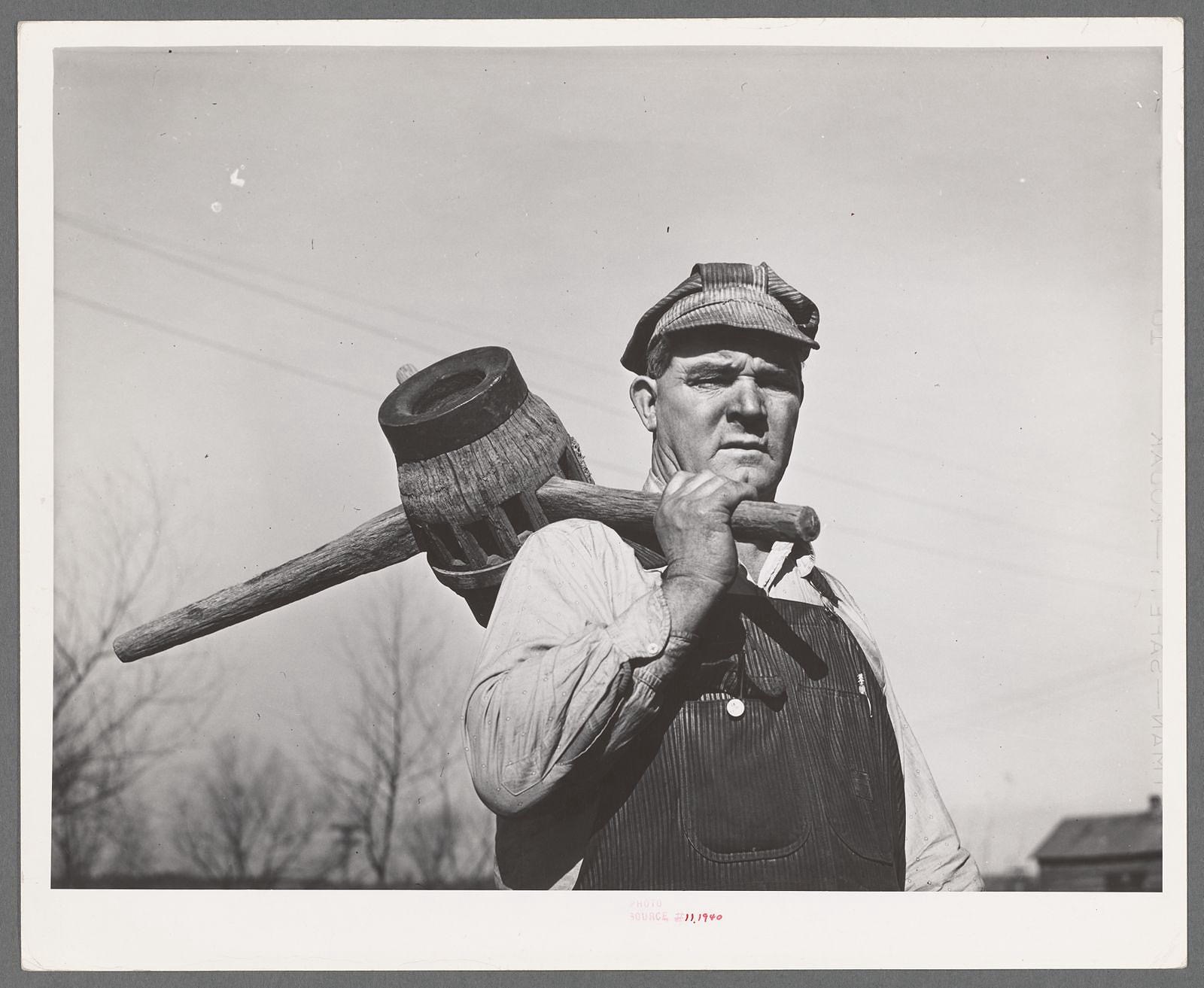
Lee Russell: Blacksmith with wagon wheel hub and spokes. Depew, Oklahoma (1940)
"Silences must frame meaning."
I earlier characterized history as being like tributaries. Like all metaphors, this one should seem imperfect in practice. Imperfect but also essential, for some visualization appears necessary in order for me to produce an orderly—or orderly-seeming—exposition. I dare not just jump all over the place, a practice I've engaged in when performing oral representations of my histories. Short stories don't demand the quality of continuity insisted upon by broader themes. I've more than once already considered that my mission might have always been impossible, even at the beginning when I felt energizing motivation. Like many endeavors, this one began as a Bright Idea! Bright Ideas! bring their own motivating forces with them and require little goosing. Bright Ideas!, however, seem fundamentally different from projects. They might prove to be the seed of a project but will need to mature into something characterized by other than blind enthusiasm. Coherence insists upon something different and much more complex.
I've been amending my original notions about this history since I started laying down the first story.


